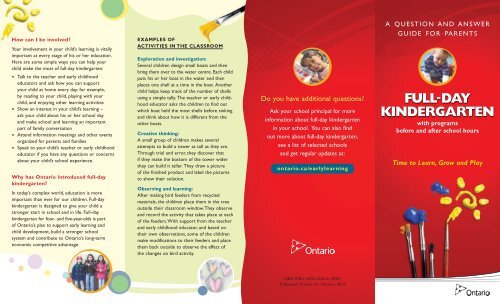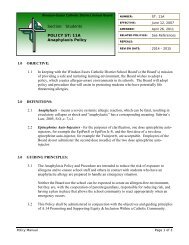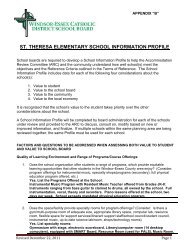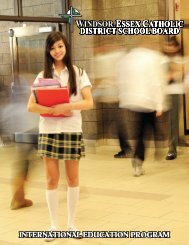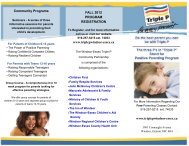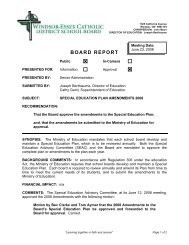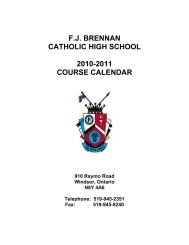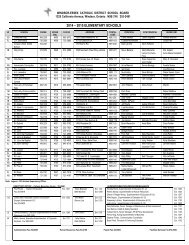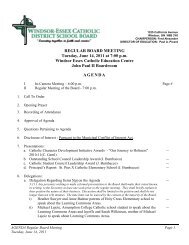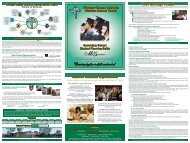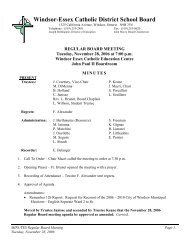Full-day kindergarten: a question and answer guide for parents
Full-day kindergarten: a question and answer guide for parents
Full-day kindergarten: a question and answer guide for parents
Create successful ePaper yourself
Turn your PDF publications into a flip-book with our unique Google optimized e-Paper software.
How can I be involved<br />
Your involvement in your child’s learning is vitally<br />
important at every stage of his or her education.<br />
Here are some simple ways you can help your<br />
child make the most of full-<strong>day</strong> <strong>kindergarten</strong>:<br />
• Talk to the teacher <strong>and</strong> early childhood<br />
educators <strong>and</strong> ask how you can support<br />
your child at home every <strong>day</strong>; <strong>for</strong> example,<br />
by reading to your child, playing with your<br />
child, <strong>and</strong> enjoying other learning activities<br />
• Show an interest in your child’s learning –<br />
ask your child about his or her school <strong>day</strong><br />
<strong>and</strong> make school <strong>and</strong> learning an important<br />
part of family conversation<br />
• Attend in<strong>for</strong>mation meetings <strong>and</strong> other events<br />
organized <strong>for</strong> <strong>parents</strong> <strong>and</strong> families<br />
• Speak to your child’s teacher or early childhood<br />
educator if you have any <strong>question</strong>s or concerns<br />
about your child’s school experience.<br />
Why has Ontario introduced full-<strong>day</strong><br />
<strong>kindergarten</strong><br />
In to<strong>day</strong>’s complex world, education is more<br />
important than ever <strong>for</strong> our children. <strong>Full</strong>-<strong>day</strong><br />
<strong>kindergarten</strong> is designed to give your child a<br />
stronger start in school <strong>and</strong> in life. <strong>Full</strong>-<strong>day</strong><br />
<strong>kindergarten</strong> <strong>for</strong> four- <strong>and</strong> five-year-olds is part<br />
of Ontario’s plan to support early learning <strong>and</strong><br />
child development, build a stronger school<br />
system <strong>and</strong> contribute to Ontario’s long-term<br />
economic competitive advantage.<br />
EXAMPLES OF<br />
ACTIVITIES IN THE CLASSROOM<br />
Exploration <strong>and</strong> investigation:<br />
Several children design small boats <strong>and</strong> then<br />
bring them over to the water centre. Each child<br />
puts his or her boat in the water <strong>and</strong> then<br />
places one shell at a time in the boat. Another<br />
child helps keep track of the number of shells<br />
using a simple tally. The teacher or early childhood<br />
educator asks the children to find out<br />
which boat held the most shells be<strong>for</strong>e sinking<br />
<strong>and</strong> think about how it is different from the<br />
other boats.<br />
Creative thinking:<br />
A small group of children makes several<br />
attempts to build a tower as tall as they are.<br />
Through trial <strong>and</strong> error, they discover that<br />
if they make the bottom of the tower wider<br />
they can build it taller. They draw a picture<br />
of the finished product <strong>and</strong> label the pictures<br />
to show their solution.<br />
Observing <strong>and</strong> learning:<br />
After making bird feeders from recycled<br />
materials, the children place them in the tree<br />
outside their classroom window.They observe<br />
<strong>and</strong> record the activity that takes place at each<br />
of the feeders.With support from the teacher<br />
<strong>and</strong> early childhood educator, <strong>and</strong> based on<br />
their own observations, some of the children<br />
make modifications to their feeders <strong>and</strong> place<br />
them back outside to observe the effect of<br />
the changes on bird activity.<br />
Do you have additional <strong>question</strong>s<br />
Ask your school principal <strong>for</strong> more<br />
in<strong>for</strong>mation about full-<strong>day</strong> <strong>kindergarten</strong><br />
in your school. You can also find<br />
out more about full-<strong>day</strong> <strong>kindergarten</strong>,<br />
see a list of selected schools<br />
<strong>and</strong> get regular updates at:<br />
ontario.ca/earlylearning<br />
A Q U E S T I O N A N D A N S W E R<br />
G U I D E F O R PA R E N T S<br />
FULL-DAY<br />
KINDERGARTEN<br />
with programs<br />
be<strong>for</strong>e <strong>and</strong> after school hours<br />
Time to Learn, Grow <strong>and</strong> Play<br />
ISBN 978-1-4435-3552-6 (PDF)<br />
© Queen’s Printer <strong>for</strong> Ontario, 2010
Beginning full-<strong>day</strong><br />
<strong>kindergarten</strong> is an exciting<br />
new step – <strong>for</strong> your child<br />
<strong>and</strong> <strong>for</strong> you.<br />
This <strong>guide</strong> was prepared to<br />
help you underst<strong>and</strong> full-<strong>day</strong><br />
<strong>kindergarten</strong> <strong>and</strong> <strong>answer</strong> some<br />
<strong>question</strong>s you may have about<br />
how it works <strong>and</strong> how it will<br />
help your child.<br />
What is full-<strong>day</strong> <strong>kindergarten</strong><br />
<strong>Full</strong>-<strong>day</strong> <strong>kindergarten</strong> provides four- <strong>and</strong><br />
five-year-olds with a seamless <strong>and</strong> integrated<br />
<strong>day</strong> that includes:<br />
• An engaging, play-based educational program<br />
during the regular school <strong>day</strong><br />
• Integrated programs be<strong>for</strong>e <strong>and</strong> after school<br />
hours designed to complement the regular<br />
school <strong>day</strong>. These are optional <strong>and</strong> are offered<br />
to <strong>parents</strong> <strong>for</strong> a reasonable fee. Subsidies will<br />
be available <strong>for</strong> families that qualify.<br />
Who will support my child’s learning<br />
Teachers <strong>and</strong> early childhood educators (ECEs)<br />
will work together to help children learn during<br />
the school <strong>day</strong>. They will implement a carefully<br />
planned program that is challenging <strong>and</strong> geared<br />
to each child’s level of development.<br />
Each child will benefit from the complementary<br />
skills <strong>and</strong> experience that early childhood<br />
educators <strong>and</strong> teachers bring to the program.<br />
With two qualified professionals in the classroom<br />
<strong>for</strong> the full school <strong>day</strong>, students will get more<br />
individual attention <strong>and</strong> opportunities to learn.<br />
Since early childhood educators are responsible<br />
<strong>for</strong> delivering the programs be<strong>for</strong>e <strong>and</strong> after school<br />
hours, they will provide a familiar face <strong>and</strong> a sense<br />
of continuity <strong>for</strong> these young students.<br />
7:00 am<br />
How will my child benefit<br />
Your child will benefit from:<br />
• A stronger start in school<br />
A full <strong>day</strong> of learning early in life can help<br />
improve your child’s reading, writing <strong>and</strong> math<br />
skills <strong>and</strong> provide a strong foundation <strong>for</strong> future<br />
learning. It also makes the transition to Grade<br />
1 easier <strong>for</strong> both you <strong>and</strong> your child. When<br />
the introduction to school is an enjoyable<br />
experience, your child is naturally inclined<br />
to learn <strong>and</strong> will be eager to be part of the<br />
school experience.<br />
• More time with classmates<br />
During the regular school <strong>day</strong>, your child<br />
will benefit from being able to socialize with<br />
other children <strong>and</strong> develop the academic <strong>and</strong><br />
social skills necessary <strong>for</strong> future success.The<br />
integrated programs that run be<strong>for</strong>e <strong>and</strong> after<br />
school hours will complement what your child<br />
learns <strong>and</strong> does during the regular school <strong>day</strong>.<br />
• A seamless <strong>and</strong> integrated <strong>day</strong><br />
Your child will remain in familiar surroundings<br />
with staff <strong>and</strong> friends, rather than moving<br />
between different programs <strong>and</strong> locations.<br />
You <strong>and</strong> your child will benefit from a<br />
simpler, less hectic <strong>day</strong>.<br />
HOW THE DAY WORKS WITH A TEACHER AND EARLY CHILDHOOD EDUCATORS (ECEs)<br />
Be<strong>for</strong>e school<br />
School <strong>day</strong><br />
NOON<br />
3:30 pm<br />
After school<br />
Teacher<br />
ECE<br />
What will my child learn <strong>and</strong> do during<br />
the regular school <strong>day</strong><br />
Your child will be involved in many different kinds<br />
of activities designed to help young learners explore,<br />
discover <strong>and</strong> grow.<br />
Research shows that there is a strong link between<br />
play <strong>and</strong> learning <strong>for</strong> young children, especially in<br />
the areas of problem solving, language <strong>and</strong> number<br />
skills, <strong>and</strong> social, physical <strong>and</strong> emotional skills. Your<br />
child will take part in spontaneous play, <strong>and</strong> also<br />
in more structured play-based learning, under<br />
the guidance of the teacher <strong>and</strong> early childhood<br />
educator. These activities will help your child to<br />
think creatively, explore <strong>and</strong> investigate, solve<br />
problems <strong>and</strong> share the learning with others.<br />
Teachers <strong>and</strong> early childhood educators in full<strong>day</strong><br />
<strong>kindergarten</strong> classes will be <strong>guide</strong>d by a new<br />
curriculum document which is designed to help<br />
your child develop the social, emotional, academic<br />
<strong>and</strong> physical skills that provide a good foundation<br />
<strong>for</strong> success in school <strong>and</strong> throughout life.<br />
What will my child learn <strong>and</strong> do be<strong>for</strong>e<br />
<strong>and</strong> after school<br />
The seamless <strong>and</strong> integrated programs be<strong>for</strong>e <strong>and</strong><br />
after school hours will complement what happens<br />
during the regular school <strong>day</strong>. Under the care of<br />
an early childhood educator, students will participate<br />
in quiet reading time, activities in the gym<br />
or outside, computer lab visits, <strong>and</strong> free play time<br />
in the classroom. The programs are optional <strong>and</strong><br />
offered at a reasonable fee determined by the<br />
school board. Subsidies will be available to some<br />
families. Check with your local principal or board<br />
<strong>for</strong> more details.<br />
9:00 am<br />
6:00 pm


